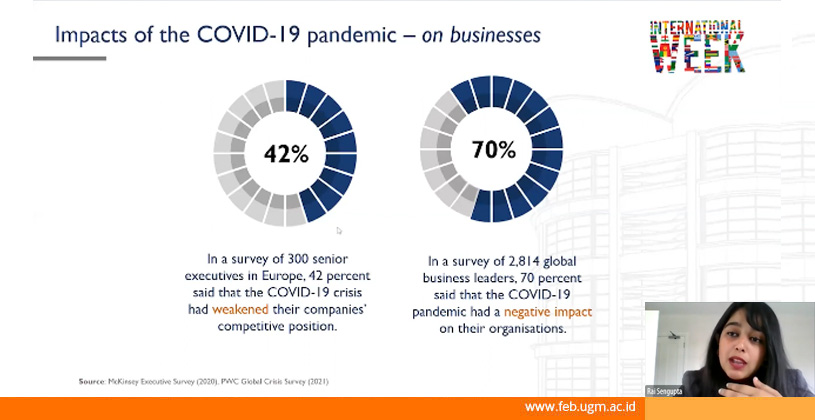Business Resilience during the Covid-19 Pandemic
- Details
- Written by Merisa
- Category: News
- Hits: 1606

Business conditions around the world during the Covid-19 pandemic can be said to be very unstable. To discuss this, the Faculty of Economics and Business, Gadjah Mada University (FEB UGM) held a webinar as part of a virtual summer program which was held on Monday (27/06), namely International Week (I-Week) 2022. In practice, a series of lectures the first I-WEEK presented an expert speaker on this topic, namely Rai Sengupta as Economics and Statistics Analyst at the Asian Development Bank with the topic "Post-covid Business Recovery, Continuity, and Resilience: Outlook at the Global Level."
Rai explained the impact that occurred due to the presence of Covid-19 which affected GDP, the tourism sector, disruption to supply chain production, and many more. Rai explained that losing yields in developing Asian countries had initially has a value of 6.0 to 9.5 percent of regional GDP in 2020 and 3.6 to 6.3 percent in 2021. She also explained the impact of GDP growth in Indonesia which in 2020 is estimated to reach 5.2 percent while its GDP growth was -2.1 percent. When there is a reduction in broad output and a decline in growth rates in countries that occur in the macro and micro economy it will automatically affect individual economic units in households and businesses were affected as well.
In his presentation, Rai explained that the Covid-19 pandemic in the business sector had an influence. Based on a survey conducted by 300 senior executives in Europe, 42% said that the Covid-19 crisis had weakened their companies' competitive position. To overcome the Covid-19 problem, businesses have a strategy for resilience. A survey conducted on 300 businesses in Europe emphasized that business model innovation was the key differentiator for resilience during the pandemic. Based on the survey, the results showed that during a crisis, the company very effectively was 1.5 times to report undertaking business model innovations. The strategy for business resilience focuses on the areas of new digital experience, new partnerships, supply chain, and operating model adjustments, sales capital change, and faster product development.
Rai explained tourism as a specific sector that was stranded due to Covid-19. In 2020, the Philippines rejected 84 percent of international flights and Indonesia rejected 75 percent of international flights. In addition, to create environmentally sustainable tourism, tourism must increase the demand for health and hygiene. There is an opportunity to recover the tourism business during a pandemic, namely by restoring demand, building new channels of demand, building capacity to support future demands, and increasing industry resilience. At the end of the presentation, Rai explained that the key factors for business sustainability are fiscal place, vaccination, and digitalization.
Reportage: Merisa Anggraini
Watch the full video https://youtu.be/m98cCC4hliM


